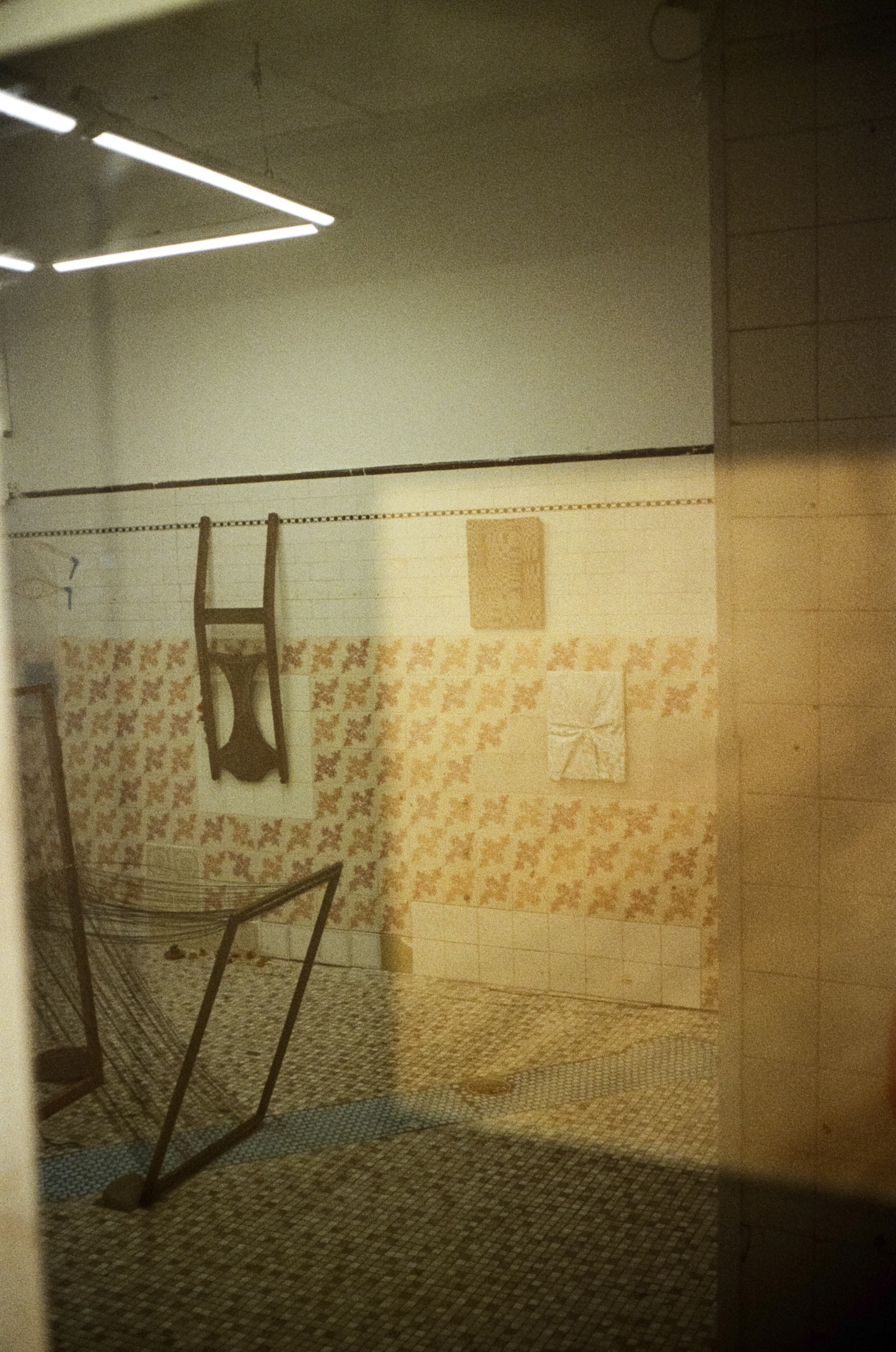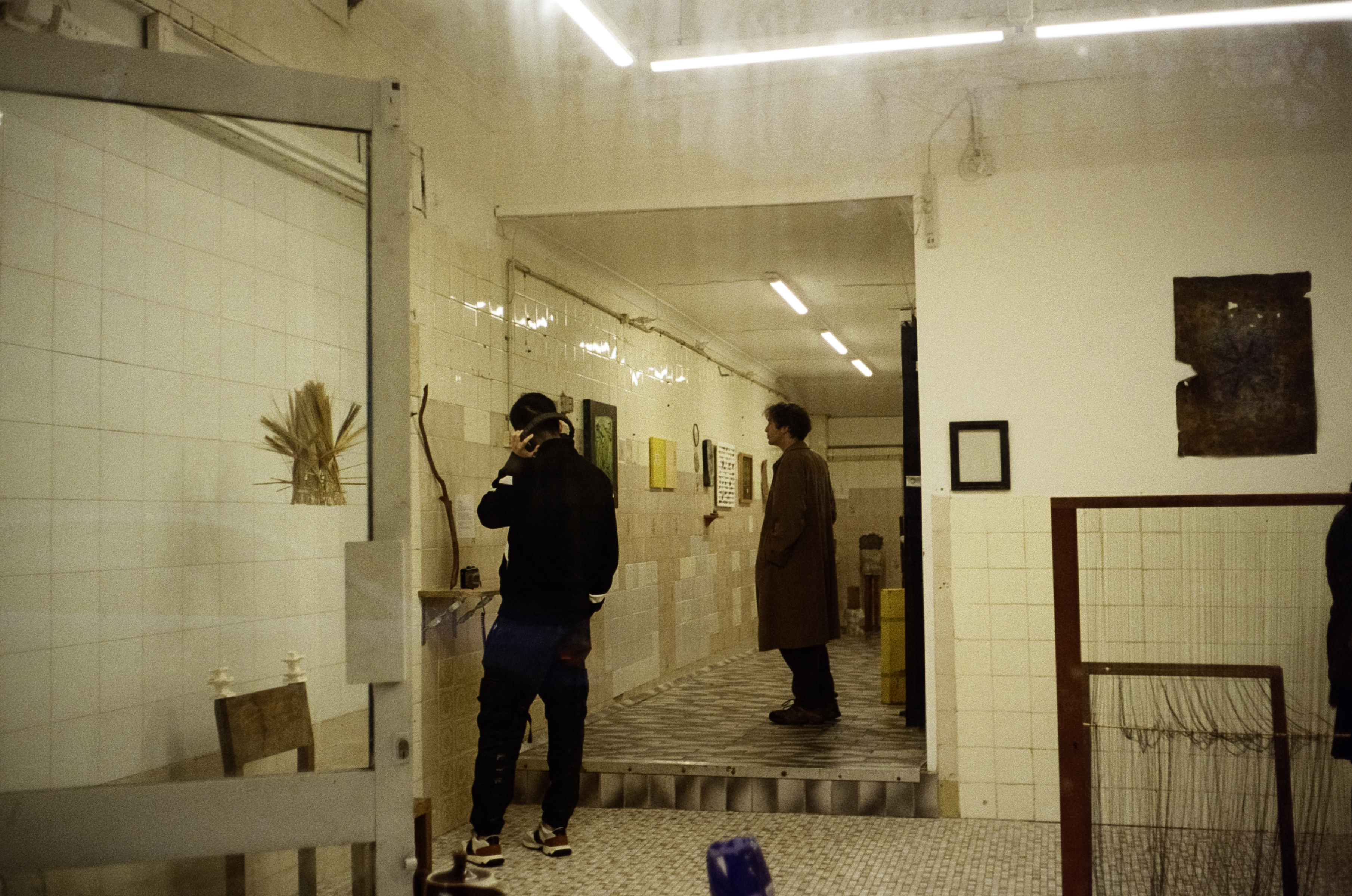New Skin for Old Song, Tiles Gallery Lewisham
Curated by Kata Szász-Komlós
“New Skin for Old Song presents 10 artists as conduits towards the transformation of a seemingly discarded or unused object. We seek no answers, only attempts towards articulating our innate interconnectedness, to ask the question; What can a world look like if we honour the inherent potential, the innate story of everything we are in relation with?
To distill this concept into its most potent form we can consider this as a kind of modern Animism; a belief that everything that exists in this world, lives and permits its own agence, that each ‘thing’ has and continues to have a story that permeates across relational fields.
...Tiles used to be an old butcher shop, a history that the gallery team chose not to efface with the introduction of a new storyline. This history lives on in a literal sense, across the walls and throughout the space but transforms within the hands of every artist whose works have been drilled into the tiles, into the space. Every green plug is another story, told within a larger one, of a community of artists.
Imagining a living world requires us to come to terms with the violence and dominion over the sacred and also, all that we have lost. A courageous creativity and spiritual praxis is being asked of us, as we witness arts institutions play word bingo, repeating empty phrases like trapped parrots in a white cage, afraid and unwilling to meet the legacy of thousands of years of creative being.
This exhibition is curated with intention and hope. This exhibition and all the participating artists support and are in solidarity with a Free Palestine, with dismantling colonial borders across the globe, emergent economic systems and First Nations reparations, land back and justice.”
- Kata Szász-Komlós (curator)
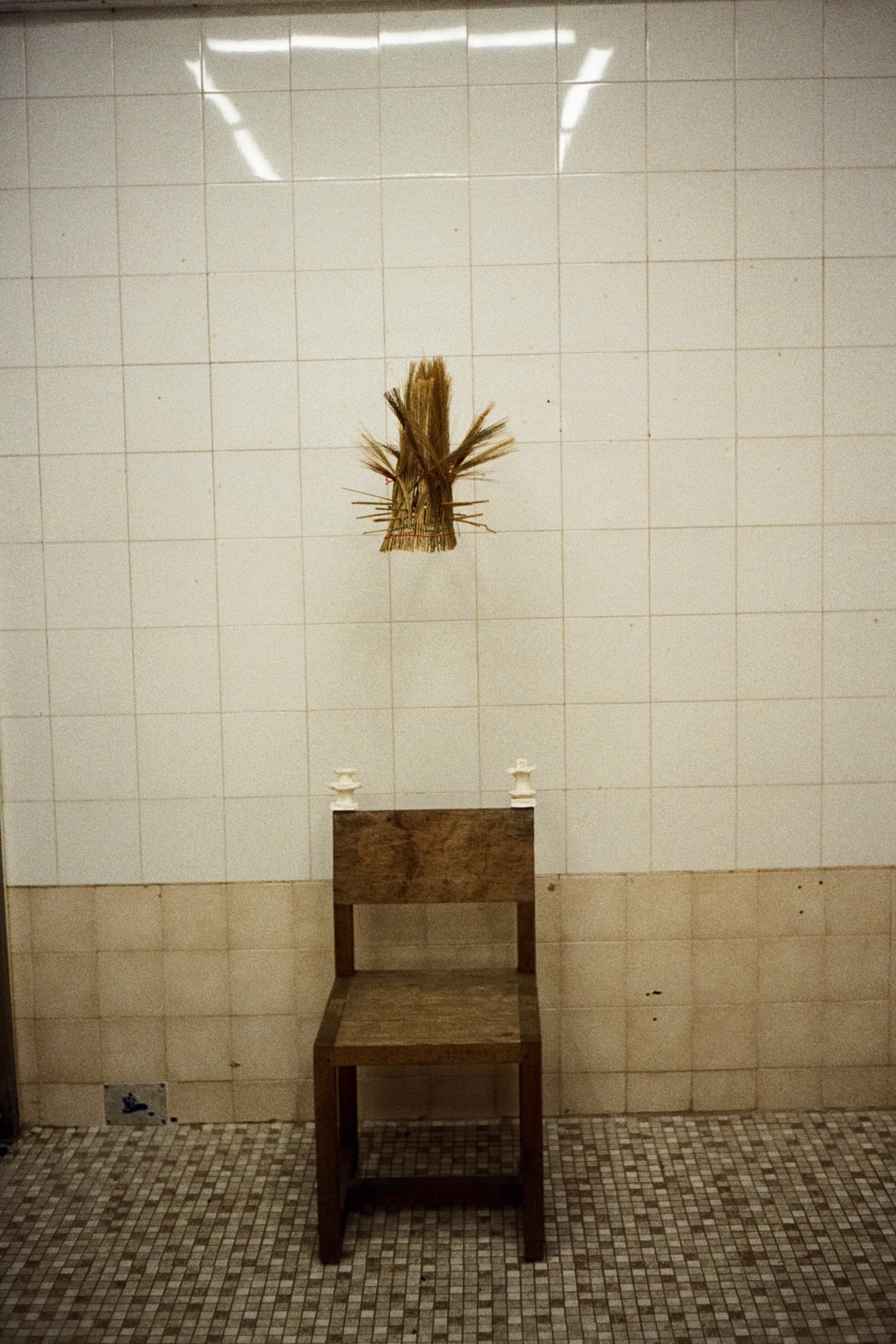
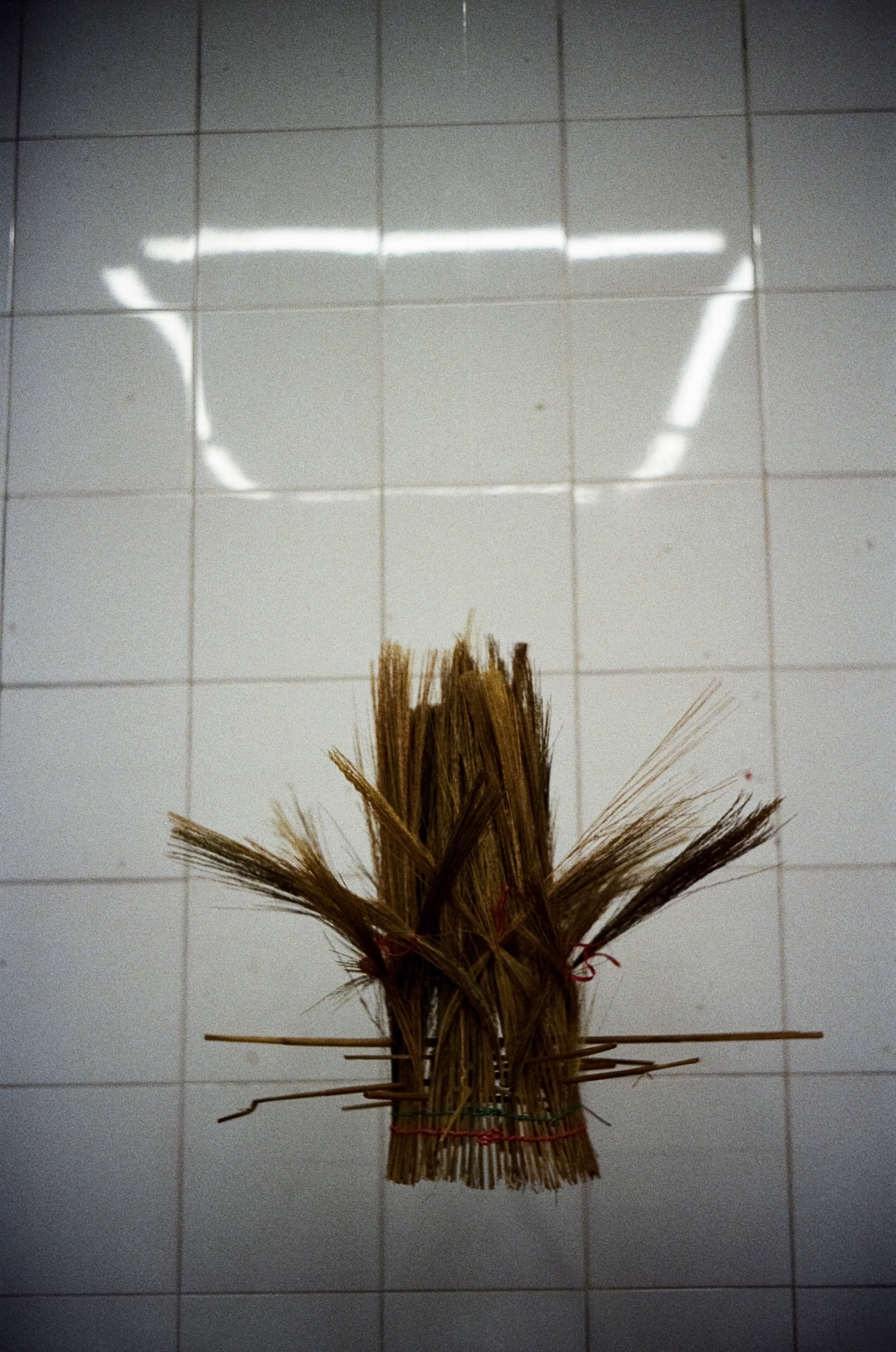
The Butterfly Chair (2024)
Roadside chair, clay, deconstructed broom
I’ve got butterflies on my mind
— featuring butterflies, crabs, a horse centipede, and a crown — materials — a roadside chair built entirely from wood (no nails or screws), clay, and a deconstructed broom.
The Butterfly Chair says there is everything and nothing to be said. Who is ‘I’ who sits in it so steadily? Why does ‘I’ wear a crown? What is ‘I’ waiting for?
Chairs are for sitting, watching, waiting. Brooms are for sweeping. Four figures ride a many-legged horse with their arms raised as if in surrender, or to fight, or perhaps they are having a nice time. Who knows which. The horse strains forward, or perhaps it is leaping with excitement. Who knows which. I made it from a place I find difficult to articulate.
It began as a feeling.
Crowns could be age, importance, nobility, power, wisdom. Butterflies could be beauty, life, hope, freedom, absentmindedness, a daydream. The crab could be hunger, playfulness, greed, a fighter, a defender, a dancer. As if the sun is contained in a butterfly’s wing, the crab is moved by its splendour and goes to touch it – or to take it. It is round and hot as a lump of coal, or a grenade. I thought I didn’t know the line between violence and games could grow so thin.
Roadside chair, clay, deconstructed broom
I’ve got butterflies on my mind
I’ve been waiting a long long time
— featuring butterflies, crabs, a horse centipede, and a crown — materials — a roadside chair built entirely from wood (no nails or screws), clay, and a deconstructed broom.
The Butterfly Chair says there is everything and nothing to be said. Who is ‘I’ who sits in it so steadily? Why does ‘I’ wear a crown? What is ‘I’ waiting for?
Chairs are for sitting, watching, waiting. Brooms are for sweeping. Four figures ride a many-legged horse with their arms raised as if in surrender, or to fight, or perhaps they are having a nice time. Who knows which. The horse strains forward, or perhaps it is leaping with excitement. Who knows which. I made it from a place I find difficult to articulate.
It began as a feeling.
Crowns could be age, importance, nobility, power, wisdom. Butterflies could be beauty, life, hope, freedom, absentmindedness, a daydream. The crab could be hunger, playfulness, greed, a fighter, a defender, a dancer. As if the sun is contained in a butterfly’s wing, the crab is moved by its splendour and goes to touch it – or to take it. It is round and hot as a lump of coal, or a grenade. I thought I didn’t know the line between violence and games could grow so thin.
The Butterfly Chair is still. But it is in the way! By the roadside, in the front yard, in the middle of the room, at the top of the hill, at the train station, inside the train, it is in the way!
‘I’ sits and waits, and history passes through ‘I’s body as if between seat and crown there were nothing but air. This is the kind of dust that brooms sweep away.
There are stories about butterflies, and about crabs. To my knowledge there are no stories about horse centipedes, but there are plenty about figures with their arms raised.
‘I’ is waiting for nothing and for something. For the fish to swim into the net, for the rains to come, for the clouds to part, for the people to come home, for home to near, for fire to grow hotter. ‘I’ is waiting for the crab to tell them why it reaches for the butterfly wing.
‘I’ is waiting to feel the fate of the figures with their arms raised. ‘I’ is waiting for new history to pass through ‘I’s body as if between seat and crown there were a human being.
From my chair I am looking out and watching, waiting
‘I’ sits and waits, and history passes through ‘I’s body as if between seat and crown there were nothing but air. This is the kind of dust that brooms sweep away.
There are stories about butterflies, and about crabs. To my knowledge there are no stories about horse centipedes, but there are plenty about figures with their arms raised.
‘I’ is waiting for nothing and for something. For the fish to swim into the net, for the rains to come, for the clouds to part, for the people to come home, for home to near, for fire to grow hotter. ‘I’ is waiting for the crab to tell them why it reaches for the butterfly wing.
‘I’ is waiting to feel the fate of the figures with their arms raised. ‘I’ is waiting for new history to pass through ‘I’s body as if between seat and crown there were a human being.
From my chair I am looking out and watching, waiting
Wherever I take my chair
I sit upon it
I am steady on my chair
Steady from my years of waiting
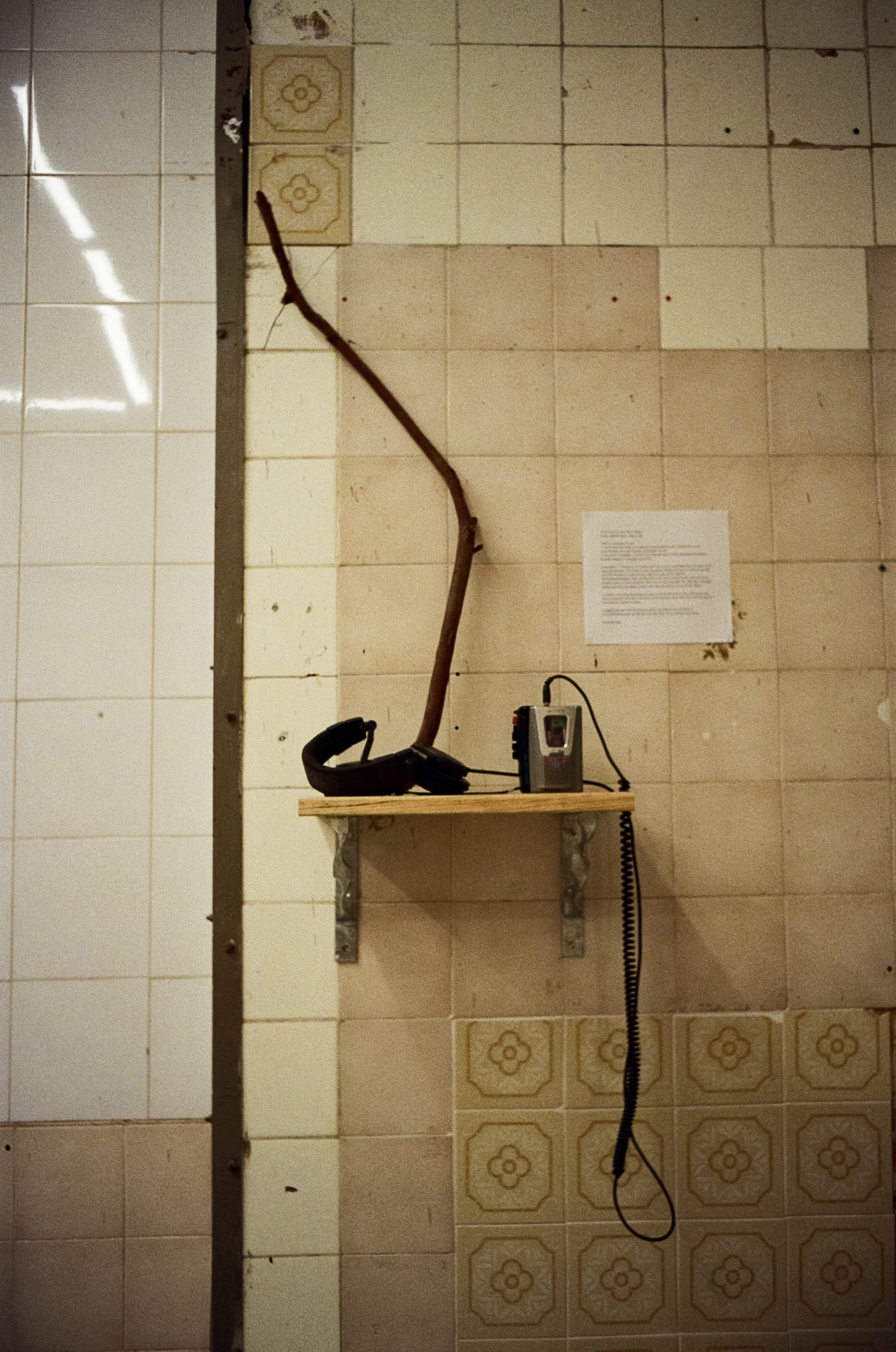
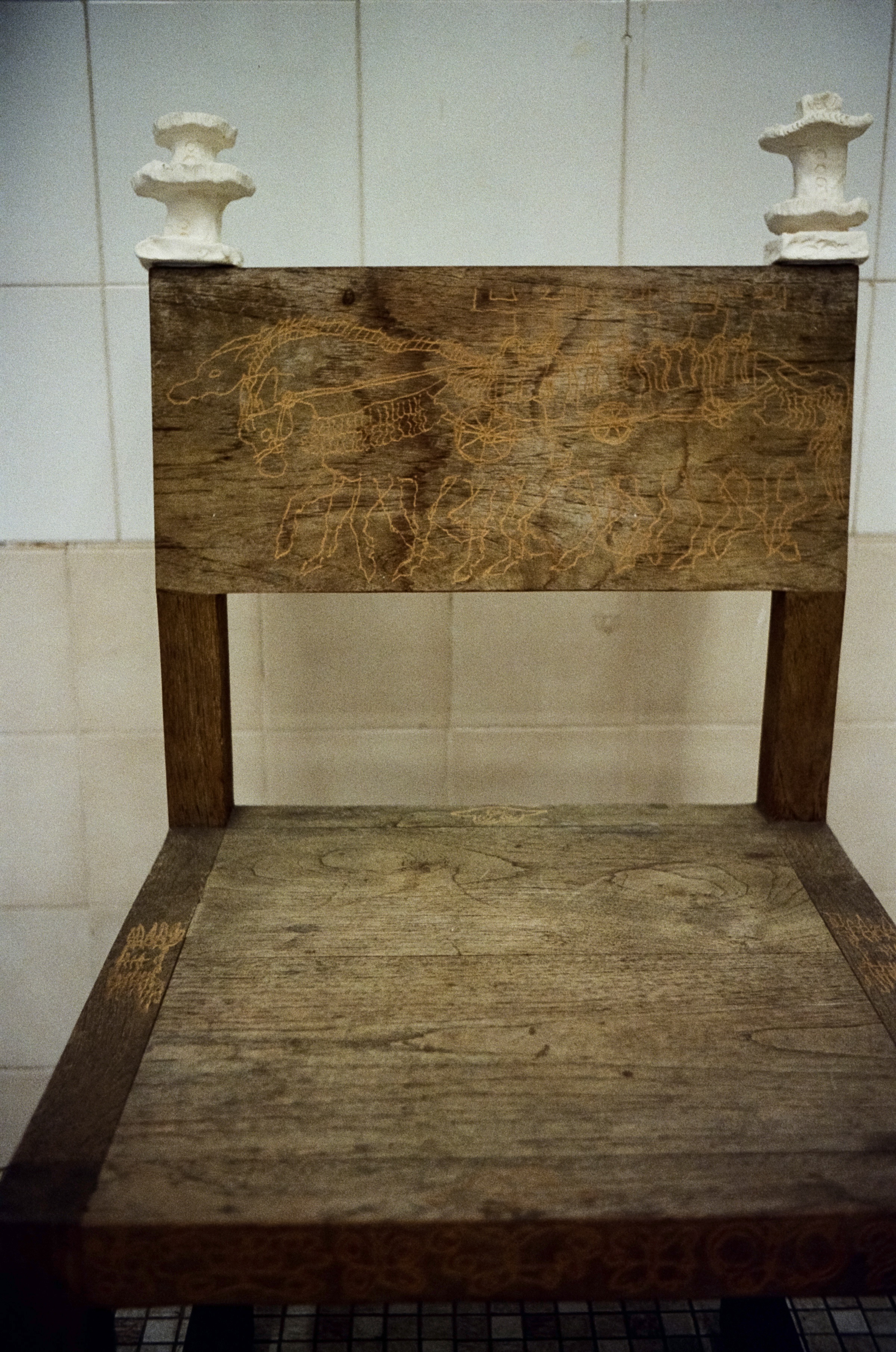
This is what the stick heard (2024)
Audio, cassette tape + player, stick
Sound is strange. Sound seems non-physical but is physical. A vibration that moves through a medium such as air, liquid, or solid. Sound travels, and can occupy, or be unnoticed. Sound can exist in many layers, can leave and return, disperse into open space, remain unanswered. I like the idea of oral traditions being momentarily physical. The vibrations of speech, song and music make physical impressions on whatever is around them as they make contact. People and places are embossed by sound.
What is a discarded sound?
Audio, cassette tape + player, stick
Sound is strange. Sound seems non-physical but is physical. A vibration that moves through a medium such as air, liquid, or solid. Sound travels, and can occupy, or be unnoticed. Sound can exist in many layers, can leave and return, disperse into open space, remain unanswered. I like the idea of oral traditions being momentarily physical. The vibrations of speech, song and music make physical impressions on whatever is around them as they make contact. People and places are embossed by sound.
What is a discarded sound?
- sound that is not made to be listened to; accidental sounds, background sounds.
-
sound that is no longer needed; undesirable sounds.
- sound that is naturally or forcibly never repeated again; songs, languages and dialects, accents changed or unspoken, words lost.
I have lived in 13 houses on 12 streets. Each had its own soundscape that over time would gradually naturalise. One of the houses was directly beside the end of a coal train line that runs from Wonnarua Country/Hunter Valley and ends at Port Waratah, Muloobinba/Newcastle. Night and day, trains over 1km in length loaded with coal would screech slowly to a halt outside my room. The din was incredible. But after many sleepless nights, even this noise began to fade, until, without noticing, I forgot it ever existed.
As children, we’d drag sticks behind us as we ran into the bush to play. The sticks made long curving lines in the dirt. If we came across someone else’s stick-trail, we’d wonder if it was made by a stick or a snake.
I dragged this stick from Eora/Sydney all the way back to that old house in Muloobinba/Newcastle, to hear the coal trains halt.
As children, we’d drag sticks behind us as we ran into the bush to play. The sticks made long curving lines in the dirt. If we came across someone else’s stick-trail, we’d wonder if it was made by a stick or a snake.
I dragged this stick from Eora/Sydney all the way back to that old house in Muloobinba/Newcastle, to hear the coal trains halt.
This is what the stick heard.
